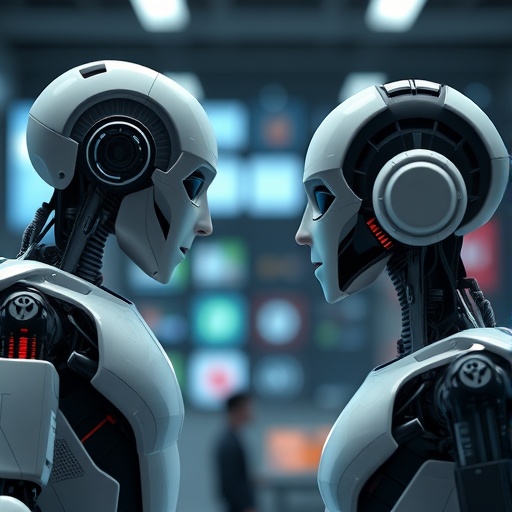In the rapidly evolving landscape of customer service, artificial intelligence (AI) systems are increasingly becoming our primary points of contact. Whether it’s a chatbot answering questions during an online shopping experience, a virtual assistant guiding customers through the logistics of package tracking, or AI-driven platforms facilitating returns, machines are now central to how consumers interact with businesses. This shift prompts a fundamental question: does it matter to customers whether they are engaging with a human or an automated system?
A groundbreaking international meta-analysis offers compelling insights into this debate, revealing that artificial agents are often received more favorably than traditionally assumed. While they don’t completely eclipse the value of human customer service representatives, the gap in effectiveness and customer preference is considerably narrower than expected. This research, published in the prestigious Journal of Marketing, was conducted by a team including Professor Holger Roschk of Aalborg University Business School, alongside Katja Gelbrich, Sandra Miederer, and Alina Kerath from the Catholic University Eichstätt-Ingolstadt. Their comprehensive review encompassed 327 experimental studies and nearly 282,000 participants, providing an unprecedented scope on the subject.
One of the most striking revelations from the study is the nuanced role context plays in shaping customer responses to artificial agents. Contrary to popular belief, customers do not always prioritize human interaction when dealing with automated systems. For instance, in scenarios where privacy is paramount—such as purchasing intimate or health-related products—customers exhibit a significant preference for chatbots. This inclination appears to stem from a desire for discretion that human interaction may not readily provide, highlighting an area where anonymity and automation intersect advantageously.
Further technical analysis illustrates that the design and function of AI agents matter deeply. Roschk explains that the prevailing expectation for artificial agents to mimic human interaction might be misplaced. Instead, customers frequently respond better to agents that maintain a distinct machine identity. This finding suggests that the inherent qualities of AI—precision, consistency, and, at times, perceived impartiality—can actually enhance customer satisfaction when their role and capabilities are transparently communicated.
Delving into specifics, algorithms shine particularly in operationally complex tasks that benefit from data processing and calculation capabilities beyond human efficiency. Routing optimizations, wait-time estimations, and personalized recommendations based on customer data sets exemplify areas where AI-driven responses outperform human attempts, especially in terms of speed and accuracy. These functionalities not only improve service delivery but also elevate the overall customer experience by reducing frustration and uncertainty.
Another fascinating insight pertains to customer reactions to negative interactions mediated by artificial agents. The meta-analysis found that AI systems often possess an unanticipated edge when delivering unfavorable news, such as loan rejections or service denials. This may be attributed to the emotionally neutral demeanor of machines, which can defuse potential hostility or dissatisfaction, leading to more measured and less confrontational customer responses.
While robots with physical embodiments prove effective in operational contexts that demand motor skills, such as room service in hotels or fulfillment tasks in warehouses, their human-like social capabilities remain limited. This division underscores the necessity of deploying the right type of agent in alignment with task complexity and required human traits. Physical robots offer tangible assistance where mechanized precision is vital but falter in areas demanding emotional intelligence and spontaneous problem-solving.
Despite the promising capabilities of AI, the research cautions against wholesale replacement of human agents. Empathy, situational judgment, and spontaneous conversational adaptation are arenas where humans currently retain a distinct advantage. These skills are indispensable in high-stakes scenarios—medical consultations, complex complaints, or emotionally charged customer interactions—where AI still struggles to replicate nuanced human understanding and compassion.
From an organizational standpoint, this nuanced understanding demands strategic deployment of AI. Companies should prioritize leveraging artificial agents to alleviate burdensome physical or cognitive tasks that do not require deep interpersonal skills. Such integration can boost efficiency and employee well-being while preserving human resources for roles where empathy and contextual decision-making are irreplaceable.
Importantly, this meta-analytic perspective also debunks the binary thinking that has often dominated the discourse around AI in customer service. Instead of viewing machines and humans as competitors, the evidence supports a model of complementary collaboration. Artificial agents excel at routine, data-driven, and private tasks, whereas humans excel at nuanced, empathetic, and context-rich interactions.
This research arrives at a critical juncture when AI adoption is rapidly accelerating across sectors as diverse as finance, healthcare, retail, and hospitality. Understanding the precise dynamics of human-machine interaction can drive more intelligent design of customer service frameworks, ultimately enhancing satisfaction, reducing operational costs, and fostering trust in automated systems.
In conclusion, the meta-analysis underscores that the future of customer service will be neither fully automated nor completely human-centric but a hybrid ecosystem. Artificial agents are not merely tools of convenience; they hold specialized strengths that, appropriately harnessed, can transform the customer experience. Their role is complementary—not adversarial—to human representatives, making their integration a calculating exercise in balance rather than replacement.
Subject of Research: People
Article Title: Automated Versus Human Agents: A Meta-Analysis of Customer Responses to Robots, Chatbots, and Algorithms and Their Contingencies
News Publication Date: 26-Aug-2025
Web References: http://dx.doi.org/10.1177/0022242925134
References: Journal of Marketing, Volume and Issue not specified
Image Credits: Not provided
Keywords: Artificial Intelligence, Customer Service, Chatbots, Algorithms, Human-Machine Interaction, Empathy, Automated Agents, Customer Experience, AI in Retail, Meta-Analysis




